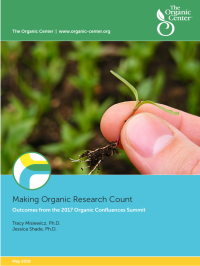2017 Organic Confluences Conference
Outcomes from the 2017 Organic Confluences Summit: Making Research Count
 Download the full White Paper here
Download the full White Paper here
The Organic Confluences Conference: Making Research Count, took place in May, 2017. The conference, presented by The Organic Center in collaboration with the U.S. Department of Agriculture’s (USDA’s) Economic Research Service, focused on making certain that the research happening in the organic sector tackles the issues most critical for moving organic forward, and on communicating research findings in the most effective way. It looked at challenges to the design, implementation, and dissemination of organic research, and provided recommendations to amplify both the significance and reach of that research.
The White Paper made the following recommendations on how to improve organic research:
1. Improve communication to organic stakeholders. Researchers must involve farmers in the development of research questions. Clear lines of communication must be maintained among farmers, academics, industry and policy influencers to make research results accessible.
2. Engage underrepresented groups. A comprehensive effort must be made to involve minorities, transitioning farmers and young or new farmers in the process of research needs gathering, cooperation in study design and execution, and results dissemination. Multiple formats should be used to distribute outreach materials.
3. Design relevant research studies that reflect organic. Organic research needs to reflect the whole systems approach of organic farming so that the research results are useful. Funding must increase for long-term research and for research that addresses the complexity of organic systems, including economic benefits and tradeoffs.
4. Make research results accessible, understandable and actionable. Researchers must have a clear understanding of their different audiences and recognize the needs of those different audiences. Funding should be increased to cover the creation of materials that convey research results to the intended audience in a compelling and understandable manner.
5. Provide adequate research funding and resources. Applied organic research is dramatically under-funded in the U.S. Specific suggestions include increasing the number of private-public partnerships, securing federal research funding for the organic sector that is proportional to organic’s market share, renewing funding in the next farm bill for USDA’s Organic Agriculture Research and Extension Initiative, and creating large-scale partnerships among multiple companies, non-profits, and researchers.
Research funding devoted for organic agriculture remains low compared to the investment in conventional sector agriculture. Accordingly, it is imperative that the dissemination of research findings is carefully targeted to reach its intended audiences, that research is conducted on topics prioritized by farmers and other stakeholders, and that information is disseminated in a form that is understandable and useful.
Funding

Funding for these conferences were provided by the USDA NIFA Organic Research and Extension Initiative grant in 2016, 2017, 2020, and 2021.

